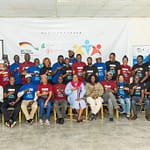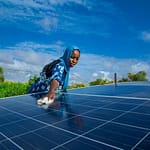The Global Summit on People-Centered Clean Energy Transitions, took place at the International Energy Agency headquarters (IEA) in Paris on April 26, 2024. The summit represented a remarkable gathering of governments, labour, business, and community leaders, Indigenous voices, and youth representatives from all over the world, who engaged in vital discussions about the most pressing socio-economic issues at the heart of fair and inclusive energy transitions. Labour leaders, representing over 200 million workers worldwide, were also present.

The summit also saw the first ever visit of the Paris Mayor to the IEA Headquarters, with a special opening address from Anne Hidalgo, Mayor of Paris.
In his opening remarks, the summit chairperson and IEA Executive Director, Dr. Fatih Birol, stressed that, as the transformation of the global energy system gathers speed, it is crucial to stay focused on ensuring that clean energy transitions benefit everyone. The summit sent a clear signal that the perspectives of labour, youth, Indigenous peoples, and other key groups must be properly integrated into clean energy transition planning. The key word for energy transitions was equity, he said.

Responding to Shifting Labour Dynamics
The Summit delegates and stakeholders clearly emphasized that labour issues were central to all clean energy transitions, and therefore labour voices were central. Experience was shared about the positive value of social dialogue and about the risks of not taking such inclusive approaches. Looking at the issue only in global and macro terms was deemed to not adequately address the specific place-based issues that need to be addressed from the very beginning of all transition processes. The importance of skill development was also emphasized. Participants shared transition experiences from their countries and regions. Delegates emphasized the importance of getting the process right in order to ensure the best results for workers and communities.

Energy Expert David Arinze emphasized the need for enhanced skilling and reskilling of youths. He said that while formal education was good, vocational skills should be developed to bridge the gap. Women’s inclusion is important in the work force. “Energy is an enabler; it is not just in itself independent,” he said.
Strengthening Gender Equality
Gender inequities in energy, ranging from poorer labour participation and remuneration for women in energy jobs, were discussed at the summit. The burden placed on women and girls in regions where traditional biomass is still the predominant means of cooking was a pressing issue at the summit. Delivering universal access to clean cooking was said to be an urgent global priority and will be the subject of an upcoming Global Summit in May being convened by the IEA and other stakeholders. However, a lack of well-elaborated gender data was said to be a barrier to progress towards a clean energy transition. The role of finance was also stressed.

Drafting Policies to Maximize Positive Social Impacts
The IEA promised to soon publish a landmark report on affordability and social impacts of clean energy policies. A report that would table the evidence for how policies can ensure a positive and fair distribution of impacts through intentional design. Throughout the sessions, the need for better data and the question of access to finance were common themes. Policymakers were encouraged to identify and track the social impacts of policies and adapt design where appropriate.
Engaging People as Active Participants
Participants widely agreed on the necessity for all transitions, in terms of policies and measures, to be based in meaningful inclusive participation from their creation to implementation stage. Transitions will not be seen as vital and essential without proper public participation. Many models of participation were discussed, ranging from formal social dialogue processes involving governments, companies and unions, to wider public participation, education and communication initiatives. Many highlighted how important it is to engage effectively and meaningfully.
The event represented an important global dialogue on how to progress clean energy transitions in a people-centered and inclusive manner. Participants expressed appreciation to the IEA for bringing this diverse group together and recognized the important role that the IEA can play in leading clean energy transitions with a focus on people and inclusivity.
Dr. Birol also announced that he is now convening a new Global Commission on People-Centered Clean Energy Transitions: Designing for Fairness. This Commission will comprise ministers, unions, business, and key voices such as youth and Indigenous communities. It will develop principles and guidance on how to ensure all clean energy policies are truly people-centered and are designed to deliver the benefits to those who need them most. The discussions of both this Summit and the new Global Commission will form direct inputs into the G20 Presidency of Brazil as well as wider international and multilateral processes, including COP.












